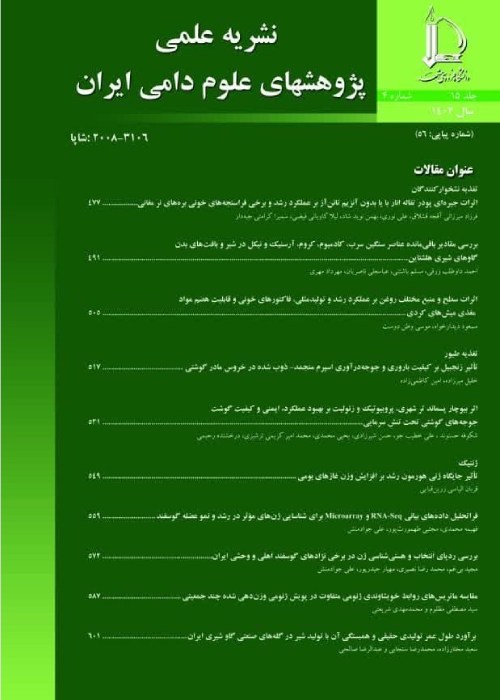The Effect of Adding Lactobacillus Isolates, Isolated from the Gastrointestinal Tract of Iranian Native Poultry on Performance, Carcass Characteristics, Blood Parameters and Safety Parameters of Broilers
Introduction:
Feed additives are commonly used in poultry feed to enhance performance, promote health, and increase nutrient efficiency. The use of antibiotics as growth promoters in poultry feed has been prevalent for years. However, due to concerns regarding the accumulation of antibiotic residues in poultry products and the development of antibiotic-resistant bacterial strains, antibiotics are no longer considered desirable additives in poultry feed. As a non-therapeutic alternative to antibiotics, probiotics have been introduced as suitable candidates to promote growth. Probiotics have beneficial effects on poultry digestive enzymes, improve intestinal absorption, and neutralize toxins produced by harmful microorganisms, ultimately improving the immune system and economic performance. Among the most popular probiotic bacteria are Lactobacilli, as they are generally classified as safe bacteria.
Materials and methods:
Lactobacillus reuteri (L. reuteri ABRIG25 (MF686485)) and salivarius (L. salivarius NABRII59 (MH595987) isolated from the digestive tract of Guilan’s native chicks and Mazandaran’s duck respectively, were prepared up to 1.36×109 CFU using MRS medium at 37 ° C, under anaerobic conditions. 300 one-day-old male Arbor-Acres chicks were distributed in a completely randomized design, with 5 treatments, 4 replications (15 chicks per replicate). Experimental treatments were: 1- Basic diet as control group (Cont), 2- Basic diet + 100 g / ton Avilamycin as antibiotic group (Anti), 3- Basic diet + 200 g / ton commercial probiotic (Lacto-feed®) (Plac), 4- Basic diet + 1 g / Kg of L. salivarius NABRII59 (MH595987) bacterial powder (Pls1), and 5- basic diet + 1 g / kg of L. reuteri ABRIG25 (MF686485) bacterial powder (Plr1). Daily feed intake, weight gain, and feed conversion ratio of broilers were determined and recorded in starter, grower, and finisher periods. On day 42, two chicks were slaughtered from each replicate and the weight of internal organs and carcass cuts were recorded as a percentage of carcass weight. Chicken antibody reaction were determined using SRBS suspension. On days 22 and 35 of the rearing period, two chicks were randomly selected from each cage and 0.1 cc of SRBC solution was injected into to the wing’s vein, intravenously. Humoral immunity test was applied on days 29 and 42, using 1 cc of blood taken from the wing vein of chickens. The hemagglutination reaction was recorded based on the last two dilutions as SRBC’s antibody using the logarithm and the antibody titer against Newcastle was determined by hem agglutination inhibition (HI) test. On day 42, blood samples were taken randomly from 2 birds per replication to evaluate blood-serum parameters including glucose, cholesterol, triglyceride, HDL, LDL and VLDL. All data were analyzed using SAS software v.9.1 (2012) in GLM procedure using a completely randomized design, and comparison of statistical means was performed, using Duncan's method at the level of 0.05.
The present study investigated the effect of native probiotic isolates (Plr1, Pls1) compared to commercial probiotics (Plac) and antibiotics (Anti) on the growth performance of chickens. The results showed no significant differences in daily feed intake, weight gain, and feed conversion ratio between experimental treatments. However, two native probiotic isolates (Plr1, Pls1), the commercial probiotic (Plac), and the antibiotic (Anti) resulted in a significant reduction (P <0.05) in proventriculus weight, while there were no significant differences in the relative weight of other organs. Both the commercial probiotic (Plac) and the native Lactobacillus isolates (Plr1 and Pls1) significantly improved total immunoglobulin and immunoglobulin G (IgG) levels after both the first and second injections (P <0.05). Lactobacillus salivarius (Pls1) isolate also significantly improved immunoglobulin M (IgM) levels after the second injection. However, there were no significant differences between treatments and the control group in terms of antibody titer against Newcastle disease vaccine, blood glucose, cholesterol, triglyceride, VLDL, and LDL levels. Probiotics can affect gut microbiota by competing for nutrients and attachment sites on the intestinal epithelial cells. Additionally, they may improve blood parameters and stimulate immune system cells to produce cytokines, which play an important role in inducing and regulating immune responses in poultry. Probiotics support lactic acid-producing bacteria and stabilize the gut microflora, which has beneficial effects on feed conversion ratio by stimulating the production of digestive enzymes. Furthermore, probiotics may reduce cholesterol synthesis by fermenting indigestible carbohydrates, leading to the production of short-chain fatty acids and ultimately lowering cholesterol levels in the host bird. Discrepancies in results reported by different researchers may partly be due to differences in chick’s age and breed, level of stress, diet composition, consumption period and duration, type of commercial probiotics, dose or amount of probiotic intake, management skills, and environmental conditions in different experiments.
The general conclusion is that the probiotic isolates used in this study are competitive with the commercial type of probiotics as well as the antibiotic used and are promising as probiotic candidate with beneficial effects on broiler’s performance, blood biochemical parameters and immune system
- حق عضویت دریافتی صرف حمایت از نشریات عضو و نگهداری، تکمیل و توسعه مگیران میشود.
- پرداخت حق اشتراک و دانلود مقالات اجازه بازنشر آن در سایر رسانههای چاپی و دیجیتال را به کاربر نمیدهد.


